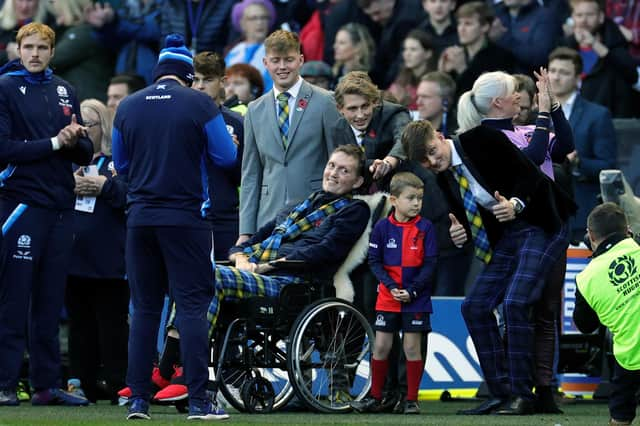Motor neurone disease: Doddie Weir was instrumental in changing UK Government's stance on research funding – Christine Jardine


For so long, hope was not a word which I associated with it, or any other form of dementia, but the fact that there might actually now be the merest glimmer, the possibility of a light at the end of that darkest of tunnels is truly brilliant. Of course, for many the news will be bittersweet as they contemplate the fact that it has come too late, or may not be effective against the form of dementia that their loved one is suffering. But that medical science may finally have pushed the door to a cure open even slightly seems like a massive advance.
Some drugs to treat dementia were certainly already available but this one, Lecanemab, is the first which offers hope of holding back Alzheimer’s debilitating and progressive effects. It works by attacking the sticky gunge – properly called beta-amyloid – that builds up in the brains of those with the condition.
Advertisement
Hide AdAdvertisement
Hide AdThe breakthrough, even with reservations about its limitations and potential side-effects, is being hailed as a turning point. A professor from the University of Edinburgh, Tara Speirs Jones was quoted as describing the results as "a big deal because we've had a 100 per cent failure rate for a long time".
But could it also be a potential turning point for medical science in its quest to conquer those other neurological conditions which have so far defied cure such as motor neurone disease (MND), multiple sclerosis, Parkinson's disease or even cancer.
And might this breakthrough, on the back of the successful anti-Covid vaccines, also encourage governments to recognise that the importance and efficacy of funding vital research should never be questioned? It seems wrong to single out any one of those conditions, but at the same time we know that the astonishing work by the late Doddie Weir helped to bring MND to wider attention in a way that shone a light more broadly on medical research.
The work he has inspired, along with others like Rob Burrows, Gordon Aikman and fundraisers like former rugby league player Kevin Sinfield has made society and politicians in particular think again about how we approach research and the priority we give it. His My Name’5 Doddie Foundation was instrumental in helping those of us campaigning at Westminster to persuade the government to ring-fence funding for MND research.
Until recently it was grouped together with funding for all neurological conditions – a situation which made it difficult for any of those listed to get the individual priority they perhaps needed and certainly deserved.
But Doddie’s determination was crucial in securing the announcement, in November 2021, of £375 million for neurodegenerative disease research, of which at least £50 million is now set aside purely for the search for treatments and, hopefully, a cure for MND. Other funding will tackle a range of conditions including dementia, Parkinson’s disease, and Alzheimer’s.
There is no doubt that Doddie, a giant of a man in so many ways, has changed the landscape on medical research, but we cannot now sit back and assume that the hard work is done and a cure will somehow just happen for MND and other conditions.
Just recently I sponsored an event at Westminster to discuss the work being done in the battle against multiple sclerosis. Again, a neurological condition which seems to have escaped decades of attempts to pin it down and find a cure.
Advertisement
Hide AdAdvertisement
Hide AdWhat struck me that day, as with every time I have taken part in a debate or meeting on MND was that those concerned will not be beaten. It is the same characteristic which helped make Doddie’s campaign the success that it has been.
But, sadly, we know that it is not enough. If medical science is to replicate its initial breakthrough against Alzheimer’s in its fight elsewhere then it needs all our help and support, both emotionally and financially.
Part of me is always torn between the desire to be supportive and do whatever I can to raise funds and anger that it is necessary. Frustration that funding of medical advancement is so dependent on the commitment of the public, and so often driven by personal experience and grief. It should not be that way and we should never have to rely on the pain of so many.
If the money is available, every attempt should be made to allocate it to those who have the time and ability to put it to the best use. Because time is not on the side of those with any life-limiting or debilitating condition. Money aside, it is the most precious of resources. And yet people like Doddie Weir, Rob Burrows, Gordon Aikman and, before them, Jacqueline du Pres, Roy Castle and others have sacrificed theirs to ensure there is help for others. Somehow, they find the strength and we owe it to them to carry on their work.
But it should not take the death of someone like Doddie to make governments listen and do what they should have done all along. Alzheimer’s has not been beaten. But these past few days have given me confidence that somehow it not only can be, but shall be. So too can MND, multiple sclerosis, Parkinson’s and so many others.
The announcement on Alzheimer’s is not the ultimate success that we need but it may be the beginning of a new era in overcoming the challenge of neurological conditions. There is hope.
Christine Jardine is the Scottish Liberal Democrat MP for Edinburgh West
Comments
Want to join the conversation? Please or to comment on this article.